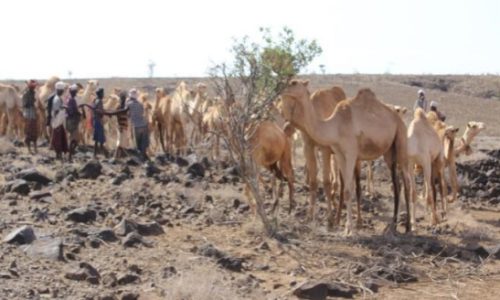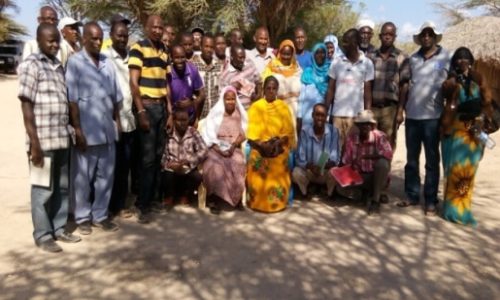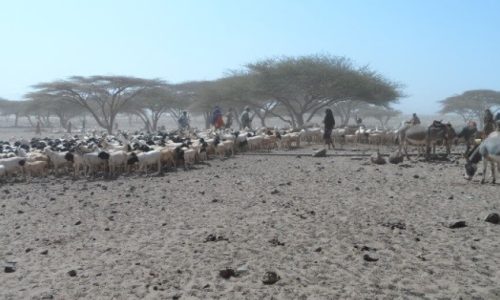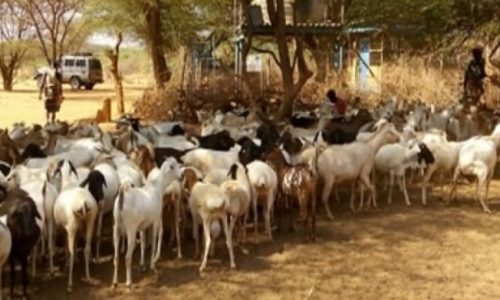Climate Action, Drought Management,
Livelihoods & Resilience
The target area of operation of PISP is mainly inhabited by nomadic pastoralists and agro-pastoralist whereby the land is mainly arid which can only support free range grazing. It is also totally dependent on rainfall for pasture growth and small subsistence farmings in few pockets, therefore, adversely affected by climate change. In the recent past more than ever before, climate change phenomenon has had direct negative impacts on the lives and livelihoods of these communities.
These effects are as a result of erratic and unpredictable rainfall patterns which leads to prolonged droughts and short duration heavy downpours leading to flash floods. These climate change patterns directly negatively affects the pastoralists and agro-pastoralists livelihoods and related dependant sectors such as food security of the entire population, health and nutrition of the infants, elderly and the expectant and lactating mothers. It also indirectly affects sectors such as education as the learners from the communities rely on their parents for school fees which depends on the livestock and farm produce as the source of their income.
You can be a helping hand
Help our organization by donating today! All donations go directly to making a difference for our cause.
Achievements
- 20 Community conversation (CC) groups.
- 42 Self-help groups supported.
- 7088 Shoats (goats and sheep).
- 575 Load/pack (male) camels.
- 460 Female camels.
- 224 Cattle.
- Cash transfers.
The emergency assistance, through water tankering relieved immense burden on the loading camels, and enabled them to survive the drought stress.
The survival of the loading camels meant that the pastoral nomads are enabled to continue practicing nomadic pastoral livelihoods as opposed to settling down in relief centers after drought emergency due to lack of baggage animal critical for the mobile lifestyle. PISP emergency assistance targeted pastoral livelihood from a holistic perspective than just saving lives during drought conditions.

Restocked pastoralist beneficiaries
PISP has no doubt demonstrated adequate capacity to handle disasters at a large scale than any undertaken before in 2009, 2011, 2012, 2013, 2014, 2016, 2017, 2019, 2021 and 2022 through funding from different partners (Caritas Austria, ECHO, CORDAID, Concern Worldwide, UNICEF, VSF-G, ARAHA, Sign of Hope and HelpAge). PISP is one of the leading agencies which responds to the drought emergencies in the county.
In future PISP will now mainly focus on resilience building of the communities and adapting to the realities of climate change.
PISP has since 2005 to date supported 42 women and mixed groups from the pastoralist communities to have alternatives and diversify their sources of incomes rather than solely relying on livestock sector. This is expected to give the communities opportunity to withstand the adverse impacts of droughts due to climate change. The beneficiaries cumulatively have now about Kenya Shillings 13 million circulating as revolving credit funds. The groups were also provided with leadership and enterprises management skills trainings.
The impact of the revolving credit funds was immensely noticed during droughts when the members of the schemes have better resilience to the droughts than the previous times and the non-members. PISP plans to continue working with her development partners to enhance this initiative among the pastoralist communities in Northern Kenya.
PISP focuses on providing backstopping support services to the groups through mentorship, coaching and direct trainings on management and entrepreneurial skills development. It also continues to support the groups to develop saving and loaning schemes amongst themselves in order to support individual members run small businesses to diversify their sources of livelihoods.
Through livelihood support projects, PISP also carried out livestock redistribution for the communities worst affected by the droughts and conflicts. This initiative goes hand-in-hand with the security, peace building, conflict prevention and recovery and drought management so that the restocked animals are not lost to the conflicts and droughts.
Through the assistance acquired from the ECHO/CORDAID, Oxfam GB &
Caritas Austria, PISP distributed these much since 2015

Livestock at Ndikir borehole powered by solar panel
7,028
Sheep & Goats
460
Female camels
575
Load camels
224
Cattle

PISP under its Marsabit Program for Enhanced Action on Resilience (MEAR) livelihood program implemented livelihood activities in both, Laisamis and North Horr Sub-Counties. The activities mainly implemented were;
- Village Community Banking (VICOBA)
- Pastoralist Field Schools(PFS)
- Pastoralist Disease Surveillance(PDS)
- Community Disaster Management Committees (CDMCs) Capacity building
PISP would continue with capacity building initiatives for the above mentioned focal groups through bench marking and training opportunities to enhance their management skills, record keeping, transparency and accountability development. PISP will also strive to create linkage with other stakeholders and duty bearers for their sustainability




